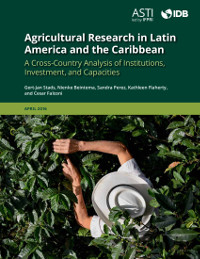Authors:
Gert-Jan Stads, Nienke Beintema, Sandra Perez, Kathleen Flaherty, and Cesar Falconi
Year:
2016
Publisher
International Food Policy Research Institute (IFPRI)
Back to:
Latin America and the Caribbean (LAC) is well situated to scale up its agricultural production in the face of a growing global population and climate change. The region’s sources of comparative advantage lie, in part, in its abundant water and land resources. To succeed in generating the research outputs needed to accelerate agricultural growth, LAC countries need sufficient, sustainable funding for strategic agricultural research programs in alignment with national and regional priorities, combined with talented, well-trained researchers.
This report assesses trends in the institutional setup, investments, and human resource capacity of agricultural R&D (excluding the private sector) in LAC up to 2013. The analysis draws largely from comprehensive datasets derived from primary surveys targeting close to 700 agencies across the region. It finds that agricultural research spending and capacity in LAC have grown progressively since the turn of the millennium, but that this regionwide growth masks considerable differences across countries. On the one hand, the region is home to Brazil, which outperforms every other country with its highly qualified research staff and world class research infrastructure and outputs. Argentina, Colombia, Costa Rica, Mexico, and Uruguay also have relatively well-developed agricultural research systems, but many other countries—especially the Central American countries, Caribbean island nations, and poorer Andean countries—are increasingly falling behind in terms of infrastructure, investment levels, and capacity.
Other key findings of the report include:
- Many countries, including Ecuador, Guatemala, Honduras, Nicaragua, Panama, and Paraguay, lack the critical mass of PhD-qualified scientists required for agricultural research to have a substantial impact on agricultural growth.
- Across LAC, a large number of highly experienced researchers will be retiring in the short to medium term. Without adequate succession strategies and training, this will create significant knowledge gaps and concerns about the quality of future research outputs.
Taking into account the various challenges related to agricultural R&D funding, human capacity, outputs, and institutional structure, the report as well as the various LAC country factsheets outline a number of policy implications for the region’s national governments.

